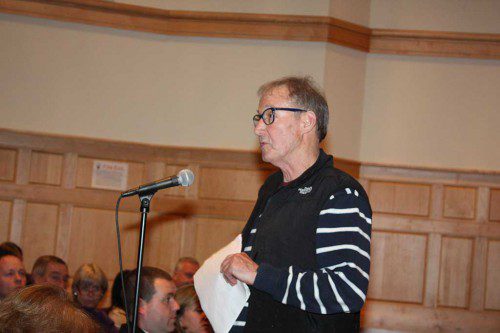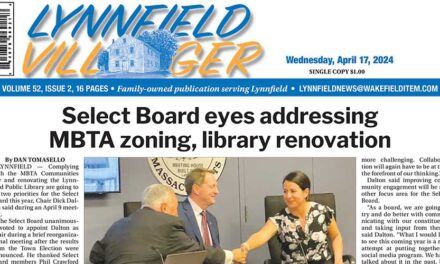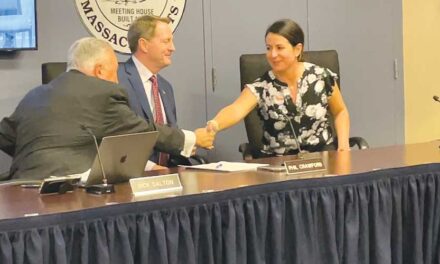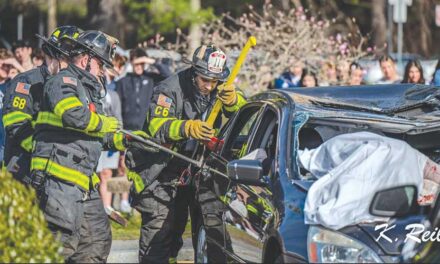Published in the May 4, 2016 edition
By MAUREEN DOHERTY
LYNNFIELD — By a unanimous vote, Town Meeting passed the designation of five scenic roads under the Scenic Roads general bylaw that was adopted last year.
Last year’s process established the basis for which roads would be determined to be suitable for such designation, with public hearings held to discuss the selected streets prior to presenting the list of streets to Town Meeting.
The five roads to which this bylaw now applies are Chestnut Street, Essex Street, Lowell Street, Main Street and Summer Street. The proposal was made by the Tree Committee.
Tree Committee member Bill Thompson said that at last year’s annual Town Meeting, Lynnfield became one of about 100 cities and towns in the state to adopt such a bylaw. Designating specific roads as “scenic,” Thompson explained, “effectively creates a level of oversight over what is done within the right-of-way on either side of the streets in town.”
“The Scenic Roads Bylaw only affects what it is in the public way. This is town land; this is not your land. There is an interface between your own land and the town land. It may be a driveway or a stonewall. As it is, the town can do pretty much what it wants within the public right-of-way without any oversight by the Planning Board or notice of meeting,” Thompson said.
Describing himself as “a stakeholder” in this process, Thompson stated, “I live on Main Street and I have two stonewalls that are within the public way and trees that are within the public right-of-way. I could wake up one morning to the sound of bulldozers out widening Main Street and cutting into the right-of-way in front of my house. I would like, if that were the case, to see what was proposed and go to the Planning Board and offer my two cents. Basically, it makes the town accountable for work that it does within these roads that we would hold to be ‘scenic.’ It would have go through the process of notice and discussion.”
These five roads were selected by the Tree Committee after the members ascertained which roads in town were scenic due to such features as stonewalls, trees or historic buildings, Thompson said.
“When people come into town along Main Street, Summer Street, Essex Street, these are the oldest streets in town. People passing through see these streets and develop an image as to what Lynnfield is all about,” he said.
Accepting these five streets with this “scenic” designation demonstrates to Thompson that “Lynnfield respects history and its past. Along with all the beautiful new developments that we have in town and new facilities, it creates what I believe to be a rounder picture of the community,” he said.
Among the nearby towns that have adopted a scenic roads bylaw, he said Weston has voted 37 scenic roads while Sudbury has 32, Peabody has four and Reading has three.
The procedure established under the bylaw to do work within the public right-of-way, whether it’s a new driveway cut requested by a private citizen or the town’s DPW widening roads, adding bike lanes or sidewalks within the right-of-way requires a petition to the Planning Board and a public hearing. “It does not have to be a particularly expensive proposition. You don’t need to have a civil engineer” come to the meeting, he said. Thompson received a round of applause following his explanation.
Tom Pagos of Pagos Way said he was concerned that the town wants to put restrictions in place for someone who “wants to put a driveway in or make some kind of change. It doesn’t make sense to me to take away the individuality of someone’s property. I don’t think the town should overrule that,” Pagos said. He said he had just gone through that process with the Planning Board when building his subdivision.
Planning Board Chairman John Faria explained that the town has gone over this proposal many times over the past couple of years and had “numerous meetings trying to determine what should be done, if anything, with the Tree Committee’s proposal.”
Faria said they turned the normal scenic bylaw “inside out.”
“We fixed it so that the only people adversely affected by this bylaw are the Board of Selectmen and the Board of Public Works,” Faria said, adding, “They cannot make any changes on any road listed as a scenic road in Lynnfield without first going for a public hearing in front of the Planning Board where anybody affected can come in and have say.”
Faria further explained that as it stands without the scenic road designation, some residents are “adversely affected because they have a tree that is partly on their lot and partly on the public way. You cannot lawfully cut down that tree. You have to go out and hire an engineer; you have to have plans made so you can present them to get permission from the tree warden to get it cut down.
“We fixed it so that if you have a tree that is partly on your land and partly on the public way, you can request a simple determination from the town engineer saying that you can take that tree town. That’s what this Scenic Road Bylaw does. It is of substantial benefit to the average person in town,” Faria said. The voters subsequently passed it and another town meeting was in the history books as this was the 32nd and last article in the warrant.
Also at Town Meeting:
The town passed by consent Articles 1, 2, 3, 12, 13, 14, 15, 18 and 19 as these were deemed routine and not controversial.
Articles 12 through 15 reauthorized the revolving accounts to allow the continued operation of fee-based programming such as the Council on Aging/Senior Center for its trips, ($50K), the Board of Health ($15K), Library Trustees ($10K) and Recreation Commission ($225,000).
Voters indefinitely postponed action on Article 5 — a standard motion seeking a transfer of funds from the EMS Retained Earnings account to pay expenses and contractual obligations for FY ’16 — because no additional funds were needed to balance that account.
Likewise, Article 6 was also indefinitely postponed because the town had no unpaid bills that would need a transfer of funds to cover.
As reported last week, along with passing an operating budget for FY’17 of $50.4M under Article 7, the voters passed a capital expenses budget of $2,528,908 under Article 8. Of that sum, $439,908 will be raised from the tax levy, $1,240,000 will come from Free Cash and $849,000 will be borrowed for purchasing new vehicles, including a fire engine.
Stabilization fund, OPED accounts
Under Article 9, the town will add $200,000 to the stabilization fund from the tax levy. It passed unanimously. Article 10, appropriating $200,000 into the town’s Capital Facilities Maintenance Fund carried. Since the town’s OPED contribution of $200,000 was added into the FY 17 operating budget, voters indefinitely postponed Article 11.
Under Article 16, which was removed from the consent agenda for discussion, a Revolving Fund that allows the DPW to spend up to $50,000, with the approval of the Town Administrator, to pay the expenses related to the maintenance and upkeep for the town’s athletic fields from the fees collected for field maintenance and field use, was passed.
According to Town Administrator Jim Boudreau, if the fund has more than $50,000 in it, those funds will remain in the account. Some maintenance will be done in-house and other maintenance will be contracted out, he said. The Recreation Commission also has oversight over this process.
Article 17 passed to establish a revolving fund for the Al Merritt Center of $10,000 collected from room rental fees to enable the DPW to spend up to $10,000 on the upkeep, maintenance and scheduling activities at the community meeting room at MarketStreet.
Injured FF’s bill paid
Town Meeting voters also voted unanimously to pay from free cash $20,000 in unpaid medical bills related to a line-of-duty injury suffered by firefighter Keith Gauvreau on Aug. 12, 2010. If the town ever receives a settlement from the insurance company, the town will be paid back.
Article 23 was indefinitely postponed. It would have appropriated a sum of money to cover the design, construction, furnishing and equipping of a clubhouse at the King Rail Golf Course, which opened April 1. There is a temporary clubhouse on site.
Crawford said they were not happy with the quotes received to date and hope to have a better idea for alternatives by October Town Meeting.
All of the articles proposed by the Planning Board to update the town’s zoning bylaws through various housekeeping articles intended to make it easier to understand and update the bylaws in the future or to clarify definitions passed under Articles 25 to 31.
The updates included a circa 1966 bylaw that limited the number of employees allowed to work in a business located within the Limited Business District to five or fewer. The ZBA now has the authority to increase that limit “above five” through the issuance of a special permit, which would be part of a public hearing process.





